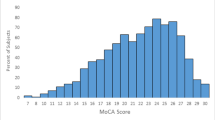Abstract
There appears to be a relative absence of studies that have examined the prevalence of cognitively intact individuals who reside in extended care facilities. Prevalence data were collected on 296 persons who resided in 3 extended care nursing facilities in Central Virginia. Cognitive intactness was evaluated via the Minimum Data Set Cognitive Performance Scale (CPS) and an author-generated survey (i.e., Cognitively Intact Survey [CI Survey]) of select nursing staff members at each facility. The Mini-Mental State Examination (MMSE) was utilized to examine the accuracy of the two measures in identifying cognitive intactness. Findings indicated that prevalence rates of cognitively intact residents varied as a function of the measures utilized to assess intactness. Specifically, a significantly greater proportion of the total sample of residents was judged to be cognitively intact via the CI Survey (34.12%) as compared to the CPS (26.01%). The level of interjudge agreement between the two measures was found to be moderately high (K = 0.68). When the MMSE was employed to verify individuals' levels of intactness, the percentages of residents predicted to actually be cognitively intact were somewhat lower for each measure. Specifically, based on the data obtained via the CI Survey, 22.75% of the total sample were predicted to actually be cognitively intact, whereas 17.85% of the sample were predicted to be intact based on the CPS results. Findings are discussed in light of factors that may have contributed to the differential prevalence rates of cognitively intact individuals obtained across the measures utilized in this study. Concerns regarding the utilization of the MMSE as a criterion measure of cognitive intactness in persons residing in extended care nursing facilities are provided, along with data on the living environments/roommate statuses of those residents judged to be intact via the CI Survey. Implications for the design of future extended care nursing units, as well as future research, are also included.
Similar content being viewed by others
REFERENCES
Anthony, J. C., LeResche, I., Niaz, U., Van Korff, M. R., and Folstein, M. F. (1982). Limits of the mini-mental state as a screening test for dementia and delirium among hospital patients. Psychol. Med. 12: 397–408. Cognitively Intact 333
Barnes, R. D., and Raskind, M. A. (1981). DSM-III criteria and the clinical diagnosis of dementia: A nursing home study. J. Gerontol. 36: 20–27.
Burns, B. J., Larson, D. B., Goldstrom, I. D., Johnson, W. E., Taube, C. A., Miller, N. E., and Mathis, E. S. (1988). Mental disorder among nursing home patients: Preliminary findings from the national nursing home survey pretest. Int. J. Geriatr. Psychiatry 3: 27–35.
Center for Quality Health Care Service and Consumer Protection (1997). Minimum data set for nursing home resident assessment and care screening 2.0, Briggs Corporation, Des Moines, IA.
Chandler, J. D., and Chandler, J. E. (1988). The prevalence of neuropsychiatric disorders in a nursing home population. J. Geriatr. Psychiatry Neurol. 1: 71–76.
Clarke, M. G., Williams, A. J., and Jones, P. A. (1981). A psychogeriatric survey of old people's homes. Br. Med. J. 283: 1307–1310.
Class, C. A., Unverzagt, F.W., Goa, S., Hall, K. S., Baiyewu, O., and Hendrie, H. C. (1996). Psychiatric disorders in African American nursing home residents. Am. J. Psychiatry 153(5): 677–681.
Cockrell, J. R., and Folstein, M. F. (1988). Mini-Mental State Examination (MMSE). Psychopharmacol. Bull. 24(4): 689–692.
Folstein, M. F., Folstein, S. E., and McHugh, P. R. (1975). “Mini-Mental State”: A practical method for grading the cognitive state of patients for the clinician. J. Psychiatry Res. 12: 189–198.
Hartmaier, S. L., Sloane, P. D., Guess, H. A., Koch, G. C., Mitchell, C. M., and Phillips, C. D. (1995). Validation of the Minimum Data Set Cognitive Performance Scale: Agreement with the Mini-Mental State Examination. J. Gerontol. 50A(2): M128–M133.
Junginger, J., Phelan, E., Cherry, K., and Levy, J. (1993). Prevalence of psychopathology in elderly persons in nursing homes and in the community. Hosp. Community Psychiatry 44: 381–383.
Lezak, M. D. (1995). Neuropsychological Assessment, 3rd edn., Oxford University Press, New York.
Longino, C. F., Jr., Soldo, B. J., and Manton, K. G. (1990). In Ferraro, K. F. (ed.), Gerontology: Perspectives and Issues, Springer, New York.
Morris, J. N., Fries, B. E., Mehr, D. R., Hawes, C., Phillips, C., Mor, V., and Lipsitz, L. A. (1994). MDS Cognitive Performance Scale. J. Gerontol. 49(4): M174–M182.
Murden, R. A., McRae, T. D., Kaner, S., and Bucknam, M. E. (1991). Mini-mental state exam scores vary with education in blacks and whites. J. Am. Geriatr. Soc. 39: 149–155.
Mutran, E., and Reitzes, D. C. (1990). In Ferraro, K. F. (ed), Gerontology: Perspectives and Issues, Springer, New York.
Rovner, B. W., German, P. S., Broadhead, J., Morriss, R. K., Brant, L. J., Blaustein, J., and Folstein, M. F. (1990). The prevalence and management of dementia and other psychiatric disorders in nursing homes. Int. Psychogeriatr. 2(1): 13–24.
Rovner, B. W., Kafonek, S., Filipp, L., Lucas, M. J., and Folstein, M. F. (1986). Prevalence of mental illness in a community nursing home. Am. J. Psychiatry 143: 446–1449.
Sabin, T. D., Vitug, A. J., and Mark, V. H. (1982). Are nursing home diagnosis and treatment inadequate? J. Am. Med. Assoc. 248: 321–322.
Tariot, P. N., Podgorski, C. A., Blazina, L., and Leibovici, A. (1993). Mental disorders in the nursing home: Another perspective. Am. J. Psychiatry 150: 1063–1069.
Author information
Authors and Affiliations
Rights and permissions
About this article
Cite this article
Crews, W.D., Ferro, N.M., Bolduc, T.A. et al. Prevalence of Cognitively Intact Individuals Residing in Extended Care Nursing Facilities. Journal of Clinical Geropsychology 8, 323–333 (2002). https://doi.org/10.1023/A:1019683408537
Issue Date:
DOI: https://doi.org/10.1023/A:1019683408537




